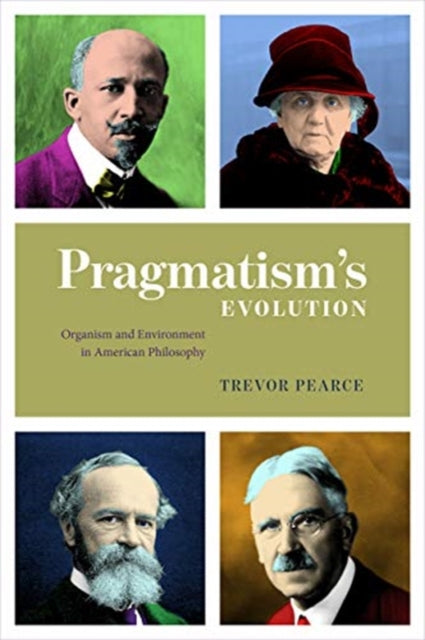Trevor Pearce
Pragmatism`s Evolution - Organism and Environment in American Philosophy
Pragmatism`s Evolution - Organism and Environment in American Philosophy
YOU SAVE £1.49
- Condition: Brand new
- UK Delivery times: Usually arrives within 2 - 3 working days
- UK Shipping: Fee starts at £2.39. Subject to product weight & dimension
Bulk ordering. Want 15 or more copies? Get a personalised quote and bigger discounts. Learn more about bulk orders.
Couldn't load pickup availability
- More about Pragmatism`s Evolution - Organism and Environment in American Philosophy
Trevor Pearce's book "Pragmatism's Evolution" shows how the philosophical tradition of pragmatism owes an enormous debt to biological debates in the late 1800s, particularly those concerning the role of the environment in development and evolution. Pearce focuses on a series of debates in biology from 1860 to 1910 in which pragmatists were active participants, arguing that we need to understand the relationship between pragmatism and biology to understand the pragmatists and their influence.
\n Format: Paperback / softback
\n Length: 384 pages
\n Publication date: 27 October 2020
\n Publisher: The University of Chicago Press
\n
In his book "Pragmatism's Evolution," Trevor Pearce explores the profound influence of biological debates on the philosophical tradition of pragmatism. These debates, particularly those centered around the role of the environment in development and evolution, played a crucial role in shaping the philosophical ideas of pragmatists such as Charles Sanders Peirce, John Dewey, and others. Pearce's book delves into the historical context of these debates, shedding light on the evolution of evolutionary ideas and their reception by American philosophers.
The book begins by tracing the origins of pragmatism in the late 1800s, a time when the life sciences were undergoing rapid transformation. Scientists such as Charles Darwin and Gregor Mendel were revolutionizing our understanding of biology, challenging traditional philosophical assumptions about the nature of reality and the role of human consciousness.
Pragmatists, who were influenced by these scientific developments, sought to develop a philosophical framework that could accommodate the changing world around them. They were particularly interested in the relationship between science and philosophy, and how they could work together to address the practical problems of everyday life.
One of the key debates in biology that pragmatists were involved in was the debate over the instincts of honeybees. In the 1860s, scientists such as August Weismann and Karl von Frisch demonstrated that honeybees had a complex system of instincts that guided their behavior. This challenged the traditional view of nature as a passive, inert entity, and led to the development of the theory of evolution by natural selection.
Pragmatists, such as Peirce and Dewey, were fascinated by the implications of this theory for philosophy. They saw it as a way of explaining the emergence of complex systems and the evolution of consciousness. They also believed that the theory of evolution could be used to address social and political problems, such as the struggle for equality and the distribution of resources.
Another debate that pragmatists were involved in was the inheritance of acquired characteristics. In the 1880s, scientists such as William Bateson and Jean-Baptiste Lamarck proposed that traits acquired during an individual's lifetime could be passed down to their offspring. This challenged the traditional view of inheritance as a purely genetic process, and led to the development of the theory of epigenesis, which suggests that environmental factors can influence gene expression and the development of traits.
Pragmatists, such as Peirce and Dewey, were again fascinated by the implications of this theory for philosophy. They saw it as a way of explaining the emergence of new ideas and the evolution of culture. They also believed that the theory of epigenesis could be used to address social and political problems, such as the impact of environmental pollution on human health and the development of sustainable practices.
In addition to these debates, pragmatists were also involved in other biological fields, such as the study of animal behavior and the evolution of language. They sought to develop a philosophical framework that could account for the complexity and diversity of the natural world, and that could be used to address practical problems in a variety of fields, from education to politics.
Throughout the book, Pearce provides a detailed analysis of the philosophical ideas of pragmatists and their engagement with the life sciences. He highlights the ways in which pragmatism influenced the development of American intellectual life, and the ways in which it continues to shape our understanding of the world today.
In conclusion, "Pragmatism's Evolution" is a fascinating book that sheds light on the profound influence of biological debates on the philosophical tradition of pragmatism. Trevor Pearce's analysis provides a valuable insight into the relationship between pragmatism and biology, and into the ways in which pragmatists sought to develop a philosophical framework that could account for the changing world around them. The book is a must-read for anyone interested in the history of philosophy, the life sciences, or the practical applications of philosophical ideas.
\n Weight: 554g\n
Dimension: 152 x 228 x 25 (mm)\n
ISBN-13: 9780226719917\n \n
This item can be found in:
UK and International shipping information
UK and International shipping information
UK Delivery and returns information:
- Delivery within 2 - 3 days when ordering in the UK.
- Shipping fee for UK customers from £2.39. Fully tracked shipping service available.
- Returns policy: Return within 30 days of receipt for full refund.
International deliveries:
Shulph Ink now ships to Australia, Belgium, Canada, France, Germany, Ireland, Italy, India, Luxembourg Saudi Arabia, Singapore, Spain, Netherlands, New Zealand, United Arab Emirates, United States of America.
- Delivery times: within 5 - 10 days for international orders.
- Shipping fee: charges vary for overseas orders. Only tracked services are available for most international orders. Some countries have untracked shipping options.
- Customs charges: If ordering to addresses outside the United Kingdom, you may or may not incur additional customs and duties fees during local delivery.


